Za’atar is a unique blend of spices that can add a depth of flavor to any dish.
Unfortunately, it might not always be available in your local grocery store.
Still, plenty of substitutes can still provide the same intense flavor with possibly even more complexity, depending on what ingredients you use.
In this blog post, we’ll look at some great substitutes for za’atar so that you can feel confident in using them – no matter what type of cuisine or cooking style you prefer!
What Is Za’atar?
Za’atar is a mixture of sumac, dried herbs, salt, and sesame seeds, commonly used as a spice blend in Middle Eastern cuisine.
It has a unique flavor that adds depth to dishes like salads, hummus, roasted vegetables, grilled meats, and more.
The herbs used in Za’atar vary from region to region – in some places, oregano and thyme are used, in others it’s marjoram or hyssop.
Za’atar is also popular as a condiment served with olive oil and pita bread.
It can be sprinkled over labneh (yogurt cheese), hummus, falafel, eggs, fish, roasted vegetables, soups, and much more.
Za’atar is a versatile spice blend that can be used in many different dishes to add a unique flavor.
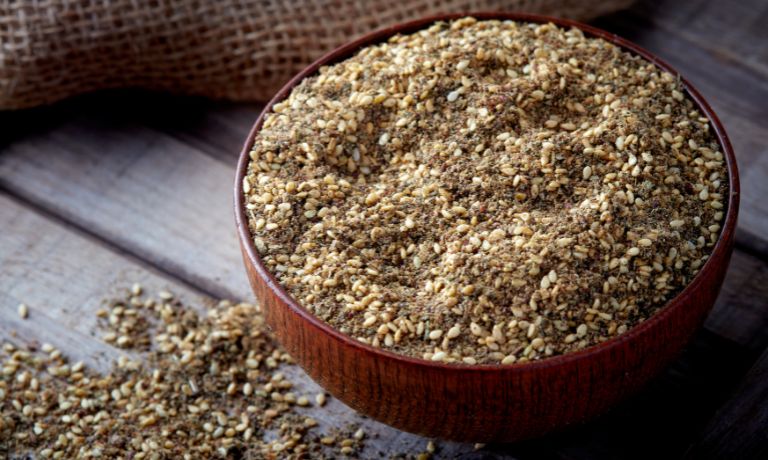
Substitutes For Za’atar
If you find yourself without any Za’atar on hand or don’t have access to it in your area, you can use some of these options instead:
Ground Thyme
Thyme is an aromatic herb used for centuries in Mediterranean cooking.
The leaves and flowers have a strong, spicy flavor and aroma, which can be used to season dishes such as soups, stews, and sauces.
In addition to its taste, thyme also contains numerous essential oils which contribute to its medicinal properties.
Ground thyme is often used as a substitute for Za’atar in recipes since the flavors of both are quite similar.
Many people also find ground thyme more readily available than za’atar, making it a great recipe substitute.
Ground thyme can be used to season meats, poultry, fish, and vegetables, as well as in soups and sauces.
Additionally, it is often used to make herbal teas with medicinal benefits.
Dukkah
Dukkah is an Egyptian spice blend of toasted nuts, sesame seeds, coriander, cumin and other spices.
It can be used as a condiment for bread or as a rub on meats and vegetables.
In Middle Eastern cooking, it is often used as a substitute for Za’atar.
Dukkah has a nutty flavor with subtle notes of cumin, coriander and other spices, which gives dishes a unique depth of flavor.
It is also often used as a topping for salads or sprinkled on yogurt or hummus to add an interesting texture and taste.
Dukkah can be used in place of za’atar as a seasoning for fish, poultry, or roasted vegetables.
It is also great when added to cooked grains such as couscous or bulgur.
Dukkah adds an exotic flair to dishes and will become a favorite go-to spice blend in your kitchen.

Harissa Powder
Harissa powder is a spice blend made of chilies, garlic, cumin, coriander and other spices.
It has a spicy flavor and can be a substitute for Za’atar in cooking.
Harissa powder can be used to season grilled meats or vegetables and added to sauces, marinades or dressings.
It can also be used as a rub for meats or vegetables before grilling and even added to soups or stews to give them a bit of extra flavor.
Harissa powder is an alternative for those who don’t have access to Za’atar or simply want to add some extra heat and spice to their dishes.
While it may not have the same flavor as Za’atar, it can still bring a unique and delicious flavor to whatever dish you cook.
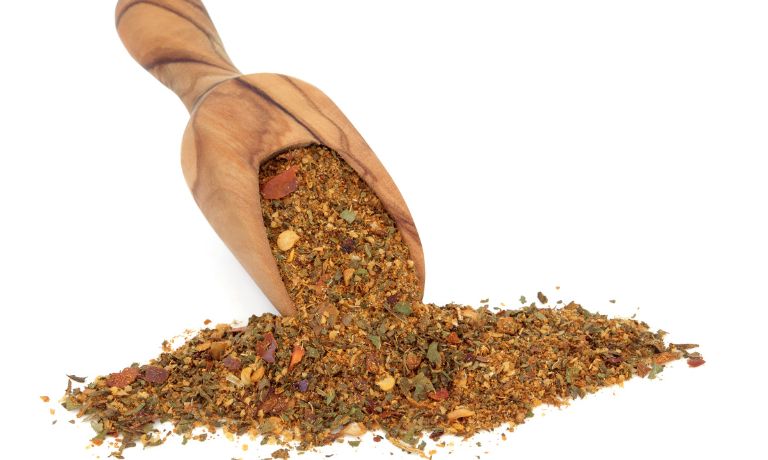
Italian Seasoning
Italian seasoning is a combination of herbs and spices that are commonly used in Italian cooking.
It usually includes oregano, basil, marjoram, rosemary, thyme, garlic powder, onion powder and red pepper flakes.
It can add flavor to pasta dishes, pizza toppings, salads and more.
As an alternative to Za’atar, Italian seasoning can bring a unique flavor to any dish.
It has a milder flavor than the traditional Middle Eastern spices that make up Za’atar and is often easier to find in grocery stores.
Additionally, Italian seasoning can lend its flavors to dishes without overpowering them like some of the more pungent spices used in Za’atar.
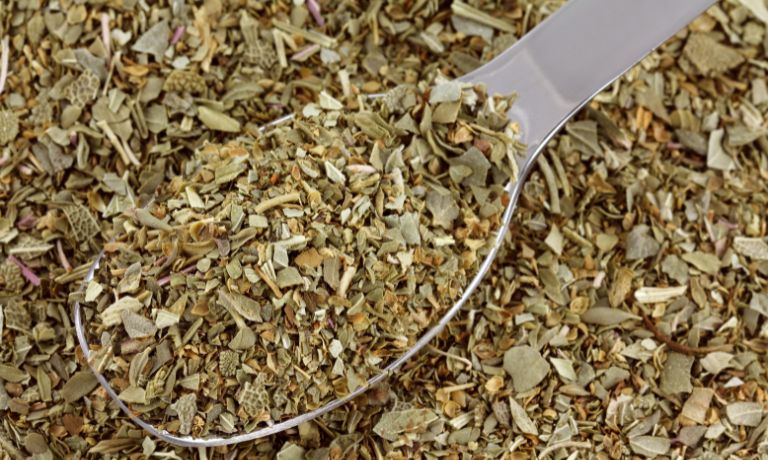
Shichimi Togarashi
Shichimi Togarashi is a Japanese spice blend that often contains some combination of chili peppers, sesame seeds, orange peel, seaweed flakes, ginger and other spices.
It can add heat and complexity to dishes without being as herbaceous or pungent as Za’atar.
Many cooks use Shichimi Togarashi as a substitute for Za’atar in recipes.
The spice mixture is often sprinkled onto noodles, rice dishes and grilled or fried foods.
It can also be used to season soups, salads and sauces.
Shichimi Togarashi instead of Za’atar can give dishes a unique, savory flavor.
It’s a great way to add depth and spice to vegetables or proteins without overpowering them with the strong flavors of Za’atar.
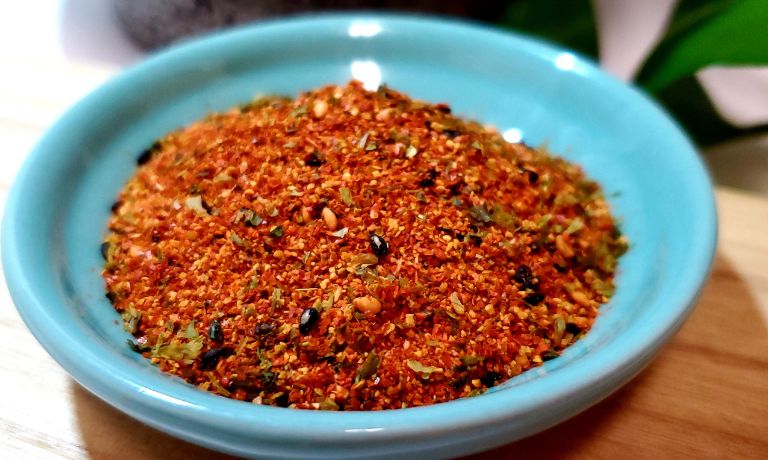
Ground Coriander
Ground coriander is a commonly used spice in many Middle Eastern and South Asian cuisines.
It is obtained by grinding the dried seeds of the cilantro plant, which are known for their distinct citrusy flavor.
As an alternative to Za’atar, ground coriander can be used as an all-purpose seasoning to add flavor to dishes without additional herbs and spices.
This makes it ideal for those wanting a simpler, more straightforward flavor profile in their cooking.
Additionally, ground coriander can replace Za’atar’s sumac ingredient, adding an earthy flavor with hints of lemon that pair well with many dishes.
Finally, ground coriander is a much cheaper alternative to Za’atar, making it very budget-friendly.
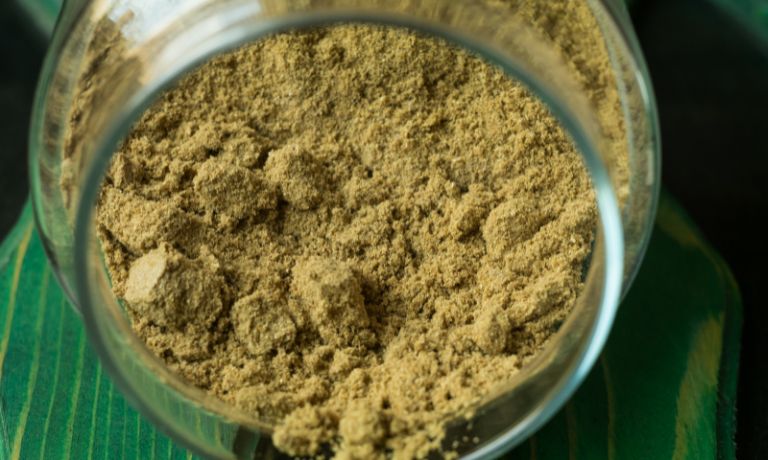
Mixed Herbs
Mixed herbs are a combination of herbs used to add flavor to foods.
Commonly, the herb blend consists of oregano, marjoram, thyme, rosemary and sage.
It can also contain additional dried herbs such as basil, tarragon or savory.
Mixed herbs offer a balanced flavor that is mild yet savory and can be used in various recipes, including as a substitute for Za’atar.
They can provide a milder and more generic flavor that enhances food taste without dominating it, as Za’atar might.
While mixed herbs cannot completely replace Za’atar, they can be combined with other spices to replicate their unique aroma and flavor.
For example, adding some sesame seeds or sumac to the mixture can create a similar flavor.
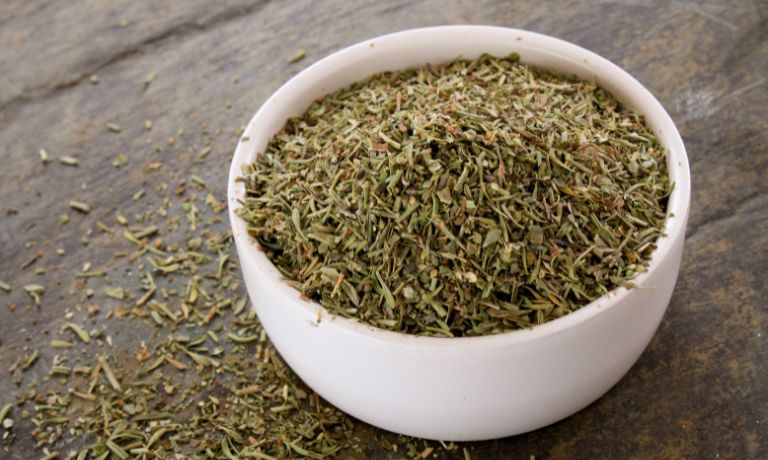
FAQs
Can I Use Sumac In Place Of Za’atar?
Yes, you can use sumac in place of za’atar.
Sumac has a similar flavor profile and can be an alternative to za’atar in recipes.
However, it does have a sharper taste than za’atar, so it may not be suitable for some dishes.
Additionally, sumac is often more expensive than za’atar, so it may be best to use it only when necessary.
Can I Substitute Dukkah For Za’atar?
Yes, you can substitute dukkah for za’atar.
Dukkah is a spice blend typically of toasted nuts and seeds, often mixed with herbs like cumin, coriander, sumac, black pepper, and other spices.
It adds a nutty flavor and crunchy texture to dishes.
Can I Use Za’atar Instead Of Thyme?
Yes, you can use za’atar as an alternative to thyme in some recipes.
Za’atar is a Middle Eastern spice blend that contains thyme, sesame seeds, and other spices such as allspice, sumac, and cumin.
It has a unique flavor profile differs slightly from straight thyme but can provide a delicious complimentary flavor to many dishes.
Conclusion
When you don’t have access to the traditional blend of Middle Eastern spices known as Za’atar, many options to substitute for za’atar can be used.
Ground thyme, dukkah, harissa powder, Italian seasoning, shichimi togarashi, ground coriander and mixed herbs are just some of the possible substitutes.
Each has its unique flavor and can bring something special to your cooking. Experiment with these different spices and find the best one for you!

